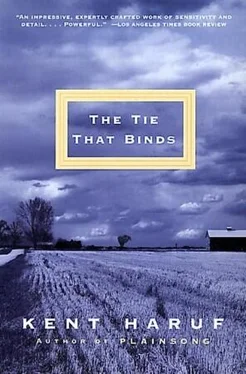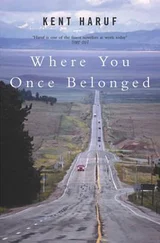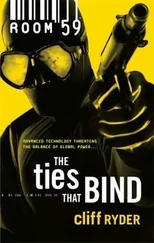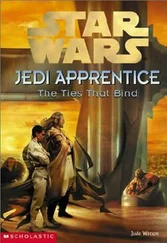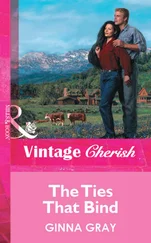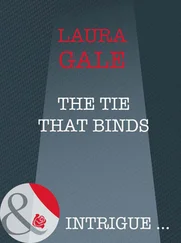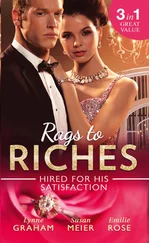My dad stood waiting for him like a bulldog might stand and wait to see what injury a gopher with rabies might do him. The old man hit him in the throat. My dad stepped back. Blood from Goodnough’s stump was smeared across his neck. The old man swung again and missed.
“Daddy,” Edith yelled. “You old fool.”
He hit my dad again, in the face this time, under the eye, leaving some more of his own blood. My dad caught him by the front of the shirt, held him eye level, then flung him hard onto the ground. The old man faltered, seemed to catch his breath; he pushed himself up from the plowed sand with his red stumps and came again, flailing his arms. My dad blocked most of that wildness but caught one in the ear. So he had the old man’s blood all over his face, and that was enough. He hit the old man with all his weight on the point of the chin, rocking his head back. The old man went down. I thought he was dead. My dad must have thought so too; he knelt beside him and lifted his eyelids. Edith scrambled off the tractor. Together they carried him over to the pickup, let down the tailgate, and laid him flat in the back. He was one hell of a mess: his hands were caked with sand; there was a raw blue swelling beginning to show on his chin; he had sandburs stuck all over his clothes. He wasn’t dead, though. He was still alive and mean in his eyes.
They stayed in the back with him while I drove the pickup over to the Goodnough house. At the house my dad carried him like he was folded clothes up the steps and on up to the bedroom, where he laid the old man down on a bed.
“Wash his face off and get some ice. He’ll live.”
Edith went back downstairs. The old man stared at my dad out of yellow watery eyes. He didn’t move any but just lay there, making a bad mess of the bed and watching my dad. Then his eyes filled and ran down his cheeks. I suppose I felt sorry for him then, too, the old bastard. He wasn’t any good; he was less than no good. His face was all pinched up, and there was that water grizzling down his cheeks into his shirt collar. But for the first time I did feel sorry for him.
Edith came back with a wet cloth and a bowl of ice cubes. She cleaned his face and hands and applied the ice to his chin, picked the sandburs from his clothes. The old man paid no attention. She took his shoes off.
“I want him out of my house.”
“Be quiet,” Edith said. “Haven’t you done enough?”
“This is my house.”
“It doesn’t matter whose house it is. Be quiet.”
“I want him out.”
“Forget it,” my dad said. “I’m going.” He leaned over the old man. “But don’t you ever put her on that tractor again. You hear me?”
“Get him out of here.”
“Next time I’ll kill you.”
“Get out.”
“I mean that. I’ll kill you first.”
The old man’s eyes were full of water again and he began to shiver in his bed like he was cold. We left then. At the bedroom door I looked back, and Edith was covering him with a blanket. She was crying now too.
We went downstairs and outside to the horse tank. My dad washed the blood and grit off his face, then we walked over to the pickup. My dad got in behind the wheel. He drove us in to town, to Holt, to the Payday Liquor Store, where he bought a fifth of whiskey and some beer. He brought it out in a paper sack. Then he drove us back out here to the country and stopped the pickup on top of a sand hill in a cow pasture.
“Son, you ever drank beer before?” he said.
“No, sir.”
“It’s time you started.”
So in the middle of a Saturday morning in 1943 I sipped the beer my dad bought me until I was drunk, while he drank whiskey and talked. He talked for hours, talked, said more to me that morning than he had in all the previous fifteen years we had lived together. He told me about his mother, his father too, what little he could remember of him, told me about the Goodnoughs, how it started with Ada and the two water buckets, how it was when Roy lost his hands, told me how he and Edith and Lyman had driven to the movies together in town for six weeks one summer. And once he had started telling it he couldn’t seem to stop; he couldn’t seem to explain things enough. There was too much of it.
I didn’t interrupt him. I sipped my beer, took a piss now and then in the sagebrush and soapweeds, and listened to him as well as I could. But towards the end of it I remember saying something innocent and foolish like, “But it’s not fair.”
And he said, “ ’Course it’s not fair. There ain’t none of it that’s fair. Life ain’t. And all our thinking it should be don’t seem to make one single damn. You might as well know that now as later.”
ONLY IN FACT my dad couldn’t accept his own advice. Against the odds and against all kinds of craziness he kept trying to change things, to ease them, even if he couldn’t finally make them fair. I suppose some of that has rubbed off on me. It’s the reason I’m telling you this. It’s why I can’t accept the idea of anybody wanting to put a woman like Edith Goodnough on trial for a thing in the world, let alone murder.
But at any rate that Saturday morning was the last time she had to drive a tractor. That same week my dad arranged it so that Charlie Best, who neighbored us to the south, would work the old man’s ground on shares. I don’t know the details, but I remember that Charlie had a hired man, a gap-toothed old plodder named Ralph Johnson, and it was Ralph Johnson who did the farming and all the tractor driving at the Goodnough place for the next nine years or so — until the old man died, that is, because after her father was dead Edith leased the ground to me. But while he still lived, breathed air and drank black coffee, nobody named Roscoe touched his land. It would have been too much. It would have been like kicking a man when he was down, like rubbing his nose in his own shit. My dad understood that; he accepted at least that part of it. So, without allowing the old man to see his hand in it, my dad arranged for Charlie Best to lease the land and then helped Charlie keep things up at the Best place.
After that we all settled into our ruts again. And sometimes, looking at this story, it seems to me like that’s about all it is: a series of independent ruts. Some of them lasted for four or five years and some lasted for twenty, but they were ruts just the same, a bunch of worn-out cow paths winding down occasionally to water and a bit of rest and maybe a good blow for a while over a block of salt, but then back again once more into all this Holt County sand. Hell, you can see it any time in any cow pasture.
But at least Edith Goodnough’s particular rut was slightly changed now. She didn’t have to disk stubble or cut hay while the old man rode insane behind her. No, all she had left to do now was take care of him, keep up the house and the garden, and still milk cows; and then the cows gradually took care of themselves: they died. One by one they got too old to milk; they were trucked to Brush to the slaughterhouse and were not replaced.
And as for the old man, he was changed some, too, now. For one thing he stopped talking. After he ordered my dad out of the house that morning, the old bastard wouldn’t say a piddling word, not a damn thing. And in some ways that was all right too; at least he wasn’t wasting air damning you anymore. But in other ways it made it harder. Now Edith had to try and guess what in the hell it was he wanted, and if she didn’t always guess right then he would stump-shove his bowl of mush off the kitchen table or he would piss his pants while she watched him— all out of meanness and that bitter old man’s silence that he refused to break. So most of the time from first spring until late fall she fed him quick and then took him outside to sit in the car alone where he could watch while Ralph Johnson made slow progress steadily in the Goodnough corn- and hayfields. In the winter months she sat him on a straight chair in front of a south window.
Читать дальше
